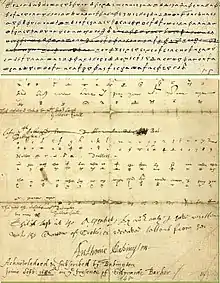Thomas Phelippes
Thomas Phelippes (1556–1625), also known as Thomas Phillips was a linguist, who was employed as a forger and intelligence gatherer. He served mainly under Sir Francis Walsingham, in the time of Elizabeth I, and most notably deciphered the coded letters of Babington Plot conspirators.
Thomas Phelippes | |
|---|---|
| Born | 1556 |
| Died | 1625 (aged 68–69) |
| Nationality | English |
Life and education
Little is known about Phelippes family background except that he was the son of a cloth merchant. Despite his humble origins, it is believed that he entered Trinity College, Cambridge, in 1569 and graduated with a Bachelor of Arts in 1574. Phelippes was a linguist who could speak French, Italian, Spanish, Latin and German. His education helped him to master cipher skills and be an excellent cryptographer of high reputation. Therefore, he was employed by Sir Francis Walsingham, the principal secretary to Queen Elizabeth I.
The physical and intellectual stature of Phelippes was described as "a small, lean, yellow-haired, short-sighted man, with pock-marked face, an excellent linguist, and, above all, a person with a positive genius for deciphering letters." [1]
Babington Plot

He is most remembered for his postscript to the "bloody letter" sent by Mary, Queen of Scots, to Anthony Babington regarding the Babington plot. When he sent Walsingham the letter proving Mary, Queen of Scots's complicity in the plot Phelippes had drawn a gallows on the envelope. According to historian Neville Williams,[2] the notes were smuggled to Mary via empty barrels from a brewer in Burton upon Trent who supplied the house at Chartley Manor where she was being held prisoner in the custody of Sir Amias Paulet. Phelippes was kept busy with a backlog of correspondence requested by Her Majesty whose letters contained day to day matters as well as those of a more sensitive type. Walsingham had to wait a whole seven months before he got what he wanted. This postscript asked Babington for the names of the plotters involved in the planned assassination of Queen Elizabeth I, and hence Francis Walsingham was able to prove Mary's direct involvement in the plot, and have her executed.
In popular culture
- In Episode Four of the 1971 BBC-TV mini-series Elizabeth R, "Horrible Conspiracies" written by Hugh Whitemore, Phelippes is played by David Nettheim.
- The 2006 TV miniseries The Virgin Queen featured Vincent Franklin as Phelippes.
- In 2020, David Oakes narrated an episode of Historic Royal Palaces' 'Outliers' podcast,[3] appearing as Phelippes.
- In the 2008 BBC Radio 4 Afternoon Play The Babington Plot written by Michael Butt, Thomas Phelippes is voiced by Jonathan Tafler.
- “The Chronicles of Christoval Alvarez” series of mystery-adventure novels authored by Ann Swinfen include Phelippes as a regular character.
- The alternate history thriller novel Ruled Britannia by Harry Turtledove features Phelippes as an important supporting character.
References
- Neale, John E. (1934). Queen Elizabeth. Alden press. pp. 270–275.
- Williams, Neville (1971) Elizabeth I, Queen of England Sphere ISBN 0722191537 p. 272
- "Outliers: Seal of Fate". Retrieved 14 Jan 2020.
Further reading
- The codebreakers, the comprehensive history of secret communication from ancient times to the internet (revised and updated 1996) – David Kahn ISBN 0-684-83130-9
- Cryptology and statecraft in the Dutch Republic – Karl de Leeuw ISBN 90-5776-039-8
- Spies & spymasters, a concise history of intelligence – Jock Haswell ISBN 0-500-01178-8
- The Watchers, a secret history of the reign of Elizabeth I – Stephen Alford ISBN 978-0-141-04365-4